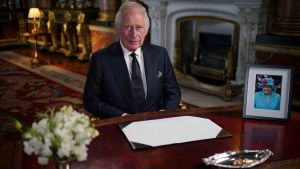Commonwealth Caribbean Wants More than Symbolic Change from British Monarchy

Faced with a new, less popular monarch, will a growing movement for republicanism accelerate in the Caribbean 'realms'?
Following the death of Queen Elizabeth II, Charles has become King, not only in the UK, but also in fourteen other countries around the world. Over half of these states are in the Caribbean and reactions to the announcement of a new King have been decidedly mixed. As people in these Caribbean ‘realms’ are faced with a new, less popular monarch, one which they have not chosen, will this accelerate a growing movement for republicanism in the region?
Antipathy toward the British monarchy was already evident before the Queen’s death, with Barbados becoming a republic in November last year. The two misjudged and controversial royal tours of the Caribbean this spring revealed an upsurge in republican sentiment across the region. Indeed, in the aftermath of these tours, governments in Belize, Jamaica, St Vincent and the Grenadines, Antigua and Barbuda, and the Bahamas all signaled their hopes to pursue republic status in the future.
The Commonwealth and the Caribbean
It is important to remember the distinction between countries that have retained the King as head of state, and those which are simply members of the Commonwealth.
The Commonwealth is a political association of fifty-six states around the world, most of which experienced colonization under the British Empire. As University of London history professor Philip Murphy argues, the modern Commonwealth functions essentially as “a network for diplomatic communications” and the head of the Commonwealth is not a hereditary position.
Within the Commonwealth, fourteen countries have kept the British monarchy as head of state, including Australia, Canada, and Jamaica. In the Caribbean, twelve states are part of the Commonwealth, but only eight have Charles as their new King and it is from these eight constitutional monarchies that the most imminent push for a new republic is likely to emanate.
A New King
Queen Elizabeth was undoubtedly a popular figure in the region, particularly among older generations. Charles does not attract the same fondness and sentimentality that some associated with the Queen: in a recent poll in Barbados, for example, only 12% of respondents had a favorable opinion of him.
Moreover, in those eight Caribbean countries where Charles has become King, there has been noticeable concern about the lack of public consultation on the new head of state. Many have been disappointed at the recent media coverage of Queen Elizabeth II’s reign, which has tended to whitewash the history of the royal family in the Caribbean. In the context of the Black Lives Matter movement, the royal family’s treatment of Meghan, Duchess of Sussex, and the Windrush scandal, silence from the Queen on the subject of institutional racism did not go unnoticed. In Barbados last year, Charles acknowledged the ‘appalling atrocity of slavery’, but this was not the apology many had hoped to hear.
Calls for Britain to engage in reparations are growing among activists and governments across the region. The British government did not finish paying off the debt it took on to compensate slave owners, for the 1833 abolition of slavery, until 2015. Tufts University history professor Kris Manjapra argues that this demonstrates how “generations of Britons have been implicated in a legacy of financial support for one of the world’s most egregious crimes against humanity”.
Given the British monarchy’s direct involvement in the transatlantic slave trade, campaigns for reparations have focused specifically on the royal family in the expectation they will catch up with other legacy institutions, such as universities, by beginning to engage in the process of reparative justice. The Queen’s death and King Charles’ diminished popularity will likely only intensify these demands.
The Challenges of a Referendum
The biggest current impediment to republicanism in many Caribbean countries is the constitutional requirement for a referendum. Belize is the only one of the remaining eight countries which could remove the British monarchy without a referendum. In the Bahamas, Jamaica, St Kitts and Nevis, and St Lucia a simple majority vote in a referendum is required. Whereas, Antigua and Barbuda, St Vincent and the Grenadines, and Grenada need a two-thirds majority vote to transition to a republic, making it a far more difficult process to achieve.
For those countries requiring a referendum, this course has historically carried risks for Caribbean political leaders. As with referenda around the world, the issue of constitutional reform can become side-tracked into a popularity contest for the incumbent government, often ending political careers.
What Does the Future Hold for Charles' Reign?
To track the Caribbean’s movement toward republicanism, Belize may be the one to watch, as it is the only state that can transition to a republic without a referendum. But former colonies are demanding more than just a symbolic change of figurehead.
As Barbados’ Prime Minister Mia Mottley has made clear, reparations are a priority for her administration. The long-lasting impact of slavery and colonialism which have left the region suffering with trauma, inequality, and underdevelopment requires meaningful reparatory justice. In the coming years, reckoning with this legacy will be at the heart of Britain and the monarchy’s relationship with the Caribbean.
Further Reading
- Barrow-Giles, Cynthia, and Don D. Marshall, eds. Living at the Borderlines: Issues in Caribbean Sovereignty and Development. Kingston, Jamaica: Ian Randle, 2003.
- Beckles, Hilary. Britain’s Black Debt: Reparations for Caribbean Slavery and Native Genocide. Kingston: University of West Indies Press, 2013.
- Murphy, Philip. The Empire’s New Clothes: The Myth of the Commonwealth. Oxford: Oxford University Press, 2018.


Related Content
 Global Politics
Global Politics
People around the world offer their perspectives on the global themes of King Charles III's first address on the world stage.
 Global Politics
Global Politics
Author and journalist Krithika Varagur examines younger generations' understanding of the British monarchy.